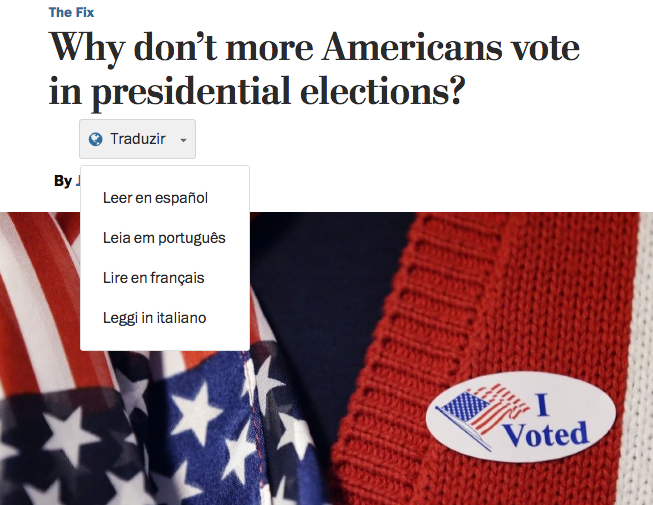
The Washington Post was preparing to publish an editorial on the Obama administration’s move, in December of 2014, to restore ties with Cuba, when executive editor Marty Baron asked about a Spanish translation. (Fun fact: Baron, born and raised in Tampa, speaks fluent Spanish.)
“Marty came and said, so we’re doing this story about Cuba. Who are we getting to translate this into Spanish?” Jeremy Gilbert, the Post’s director of strategic initiatives, recalled.
That editorial became one of the first Post stories made available in both English and Spanish online. Gilbert, who works under one of the Post’s two managing editors, Emilio Garcia-Ruiz, said his team was already prepared for this kind of request, and began experimenting with workflows.

The Post has since translated a handful of relevant foreign news stories, such as Cuba or Zika virus coverage, and exclusive stories, such as interviews with two former Mexican presidents about Trump’s plans for a wall (an “estúpido muro”). It has had to be deliberate about which few stories to translate, and how to distribute them, whether on the Post website, through its news wire services, or social channels.
“We were convinced that there is a need for translated articles, but we hadn’t hit on the right formulation in terms of how to get a professionalized translation that’s turned around quickly enough for our purposes,” Gilbert said. “At the base level, we’re experimenting with which articles we’re translating and how frequently we’re translating, to build a real audience for them. We’re looking at very specific articles that could have a little bit more life, that we could translate and just leave up there.”
Explainers about the American political process fit the bill. People from outside the U.S. want some guidance on the 2016 election circus, Gilbert said, and traffic from international areas is “one of the fastest-growing segments of the Post’s audience.” In April, the Post’s website saw 19.5 million international readers, according to Omniture data. (The international percentage of the site’s total online audience can’t be shared, a spokesperson told me, because the publication only shares comScore numbers publicly and doesn’t have a comScore figure for international readers.)Articles like this recent explainer on low voter turnout include facts that may seem obvious to a U.S. readership (“Election Day in the United States is not a national holiday, and voting isn’t compulsory”); that post allows readers to toggle between English, Portuguese, French, and Italian versions. It is, as the article’s preface notes explicitly, “part of our attempt to reach new readers who are interested in American politics — but perhaps don’t speak English or understand how American government works.”

The Post has translated several other politics explainers — “Why are there only two parties in American politics?” “Why do American elections last so long?” “What happens if nobody wins the nomination before the convention?” — and is publishing them online throughout the summer, as well as distributing them to “hundreds of international clients” through its wire service. For its set of political explainers, the Post pays a company for professional translations, and staffers also read them over.
“Part of our challenge is, the things Americans learn in civics classes, we never explain in our articles. We just say there is a primary coming up, but not why is there a primary. We say the Republican or Democratic party, but not why there are two parties,” Gilbert said. “For the election-related explainers, we challenged our copyeditors to re-edit the stories written by our politics team assuming no knowledge. They still have concepts and analogies and knowledge that might not translate smoothly.”
The Post had surveyed news wire clients to gauge interest from different countries in the topics and received requests for far more languages than it could handle, so it started with areas where there appeared to be the largest audiences. (If you’re thinking it all sounds a bit Eurocentric, the team did also distribute Mandarin Chinese versions of the explainers, but Chinese isn’t available online due to issues rendering the text. The Post is working on the template so it will be supported.)
It’s difficult to determine how many times an individual translation has been viewed because articles are distributed to so many news wire clients, but so far the translations have been well received, according to Gilbert. Paid social posts targeting speakers of specific languages have also been effective.
But currently, a French speaker who lands on, say, the article “Pourquoi les élections américaines durent-elles aussi longtemps?” won’t find much else to read on the Post’s website.
@rkellett Wow, since when do we publish articles in French?
— Julie Zauzmer (@JulieZauzmer) May 6, 2016
“One of the reasons we are publishing on our site is to see if we can start building an actual audience who will come to us. As we publish more in those various languages, we can start to link from one explainer to another within, for instance, Spanish or Italian or French,” Gilbert said. “Going forward, we’d love to add Arabic, Tagalog — there are a couple of others we’d for sure like to do, like Russian. We’ll continue to add languages as long as we can see growth in audience interest.”
So far, rolling out the political explainer set “has felt like the smartest investment,” but the Post has also discussed doing something similar around the Olympics or the impeachment efforts in Brazil.
“We’re committed to winning the largest audience for all the kinds of reporting that we do, and that audience is going to be international as well as national,” Gilbert said. “And that probably will mean more translated stories.”